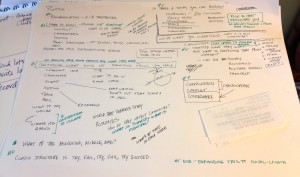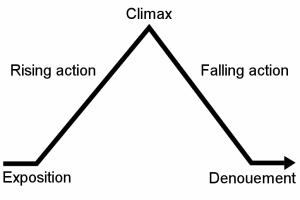
 Recently the question of omniscient POV has come up in several classes, so I started reading some examples of it. One of the best I hit was Sherwood Smith’s Inda series. I figured, why not go to Sherwood and ask some questions about how she pulled that off.
Recently the question of omniscient POV has come up in several classes, so I started reading some examples of it. One of the best I hit was Sherwood Smith’s Inda series. I figured, why not go to Sherwood and ask some questions about how she pulled that off.
What drew you to using omniscient point of view for the Inda series? What sorts of stories work particularly well with that POV? Were there any models that you looked when working with it?
...

Hence this story of two cultures clashing, and both the gender norms and the norms around the sex act are getting tangled up in interesting ways.
Anyhow, this is currently the story’s beginning (and is a good candidate to remain the beginning):
...

So for Patreon, another Serendib story, and a return to The Dark and Tericatus. Here’s some from yesterday:
After she’d hopped the wall, it had been easy enough to defeat the bloodsucking ivy and the centipede hounds contained in the first set of walls. After that, it got more interesting.
The Dark rarely stooped to thievery nowadays but, the truth be told, it was how she had started her professional life, long ago in a city whose name she had deliberately forgotten. She had been a child born to both privilege and indifference. At fifteen, she had left the school where her parents had stored her in order to make a living from burglarizing the friends of those parents, at least those whose estates and townhouses she’d had occasion to reconnoiter in her adolescent years.
She had done quite well by this, well enough that she spread the largesse to those less comfortable, and in doing so, became known as “The Dark Angel.” When, sixteen months later, the unnamed order of assassins that had noted her exploits came to recruit her, they demanded she remained herself, which she did by truncating the former name to the form she had gone by several decades now.
She had kept that knowledge to herself as, over the course of those decades, she’d met any number of unusual characters, including her spouse for two of those decades, Tericatus the alchemist-mage, Chig the Rat God, and quite a few fellow assassins who failed to live up to the high standards she held when it came to both of her professions.
She had retired from assassinations ““ aside from the occasional hobbyist or wager-related killing ““ some time ago, but now to thievery not so much for entertainment but also because she was impelled by the yearly conundrum of a suitable anniversary present for a man who could, literally, conjure almost anything his heart could imagine.
The next wall was made of fricklebrick, which sounds amusing but involves a number of razor-sharp edges shifting frequently and somewhat randomly in their orientation.
As she paused, letting the gloves covering her hands sense the vibrations of the bricks and adjust themselves to countershift accordingly in a gentle grinding born of magic and machinery, she thought about his imagination and ““ not the for the first time ““ contemalted her luck in a mate who had long ago grown blasé with such things and preferred inner qualities of fierceness and determined loyalty.
She wriggled upwards, her features smeared with coalblack to match the midnight shadows around her. This year, she planned to snare something lovely that could not be bought ““ her philosophy of presents was that such things were better assembled by than by coin.This garden, located on one of the great terraces built along the mountain slope bordering the city to the north, belonged to a recent arrival to the city, a merchant/scientist whose name the Dark kept having tremendous difficulty remembering. This spoke of certain magics laid upon the name to avoid notice, and that was intriguing, and more intriguing yet were the rumors of the contents of the innermost garden, center of three sets of walls, which held a worthy gift.
This weekend I’m teaching Creating An Online Presence for Writers and the Flash Fiction Workshop – there’s still a few slots open if you’re interested!
#sfwapro
Enjoy this sample of Cat’s writing and want more of it on a weekly basis, along with insights into process, recipes, photos of Taco Cat, chances to ask Cat (or Taco) questions, discounts on and news of new classes, and more? Support her on Patreon..
...

I begin with some basics of story mechanics. Quite probably much of it will be familiar — feel free to skim if you feel like you’ve heard all of this before.
...
Neil Gaiman has been catching a lot of flack for this tweet.
People are, understandably, saying that the equation clarion + student = pro writer is not the only way you can reach that particular sum, and they are absolutely correct, although the drama is — as is often the case on the Internet — a bit hyperbolic.
This is the fact of F&SF (and any other genre) writing — there are writers disadvantaged by gender, or race, or sexuality or other physical circumstances. But there’s also a big group — which contains a disproportionate number of those differing physically — affected by economic issues.
Here are two simple facts:
But there is nothing being taught at a workshop that you cannot pick up by yourself, given time, though it is true that workshop teaching can often be inspirational, effective, and sometimes entirely life-changing.
Being able to attend a convention or workshop is not just a matter of being able to pay the substantial fee. It’s being able to travel and most importantly — it’s being able to take time away from both work and family. That’s an incredible privilege.
I came through Clarion West in 2005. My instructors were (in chronological order) Octavia Butler, Andy Duncan, L. Timmel DuChamp, Connie Willis, Gordon Van Gelder, and Michael Swanwick. I am a pretty convivial person, and remain close friends with the majority of my instructors. I also was part of a talented class that included E.C. Myers (winner of the Andre Norton Award for his book Fair Coin), Rachel Swirsky (frequent nominee and winner of things) and goddamn Ann Leckie, whose Ancillary series has set the bar for success so high the rest of us are just going, “Yeah right.”
I was able to do this because I had a partner willing to let me quit my job and try writing for a while. A decade later, I have yet to make half of what my Microsoft salary was through writing; I continue to persevere. If I had a family to support, it would have been incredibly difficult to do it — perhaps simply impossible. It gave me an advantage, and it also kicked me in the ass to be productive, because I was intensely aware of just how lucky I was.
Neil is — obviously — not saying you can’t be a writer without such a workshop. Note that Gaiman himself did not go to such a workshop, as far as I know. He is, though, enthused about the workshop (as befits a former instructor) and aware of what a big advantage it can prove.
But it also depends on what you make of it. In any class there will be those who persevere and those who fall by the wayside. Of the people in my writing workshop from decades ago at Hopkins, only a handful are still writing. Ten years later, a few members of my Clarion West class seem to have dropped off the face of the planet.
You have to want it hard enough to work for it, no matter what. You have to be willing to make time for writing words down and thinking about the order and what happens when you rearrange them. You have to have a hide hard enough to survive the day when there’s three rejections plus a nice fan letter whose writer is confused and thinks you’re someone else with a similar name. You have to be willing to trim away some bullshit activities and substitute stuff that lets you work at your craft, like reading or taking online classes or whatever. That’s the part you need.
A while back, I read someone saying that we all have someone who gives us permission to call ourselves a writer. For me, it was John Barth: sitting in his sunlit Hopkins office, a bookcase framing his smiling, balding head talking about my stories and a fellowship he wanted me to apply for is something I will always remember. But that is less important than giving yourself permission to call yourself a writer. It’s harder — it requires a certain amount of adamant ego and determination — but that permission can — and must — come from inside as well as externally. That’s the most important component, and you can do it with or without the aid of a workshop.
TL;DR version? Ain’t nothing going to substitute for hard work. Why aren’t you writing?
Later addendum: Most of the workshops do offer some scholarships; if there’s one you’re interested in, I do suggest asking about what financial aid is available.
...
 If I were truly organized, this would have appeared on New Year’s Day, but I had a very nice weekend instead. Now it’s Monday, and I’ve had my coffee and homemade yogurt and done some stuff. I’m feeling good about the year and have made the usual sorts of resolutions. Things that I’m trying in 2016:
If I were truly organized, this would have appeared on New Year’s Day, but I had a very nice weekend instead. Now it’s Monday, and I’ve had my coffee and homemade yogurt and done some stuff. I’m feeling good about the year and have made the usual sorts of resolutions. Things that I’m trying in 2016:
More productive. Daily writing, no matter what the circumstances, shooting for 3k, but taking 1k as the absolute minimum. Getting the novel done, done, done, and a slew of other stories and projects, all stuff I’m looking forward to, but which must be banged out and then (ugh) revised. Daily free-writes to get warmed up and help me listen to my unconscious. Doing some of the daily little practices that end up accumulating, like practicing my Spanish on Duolingo.
More organized. Sitting down in the morning to take ten minutes to sort out my day and write the three most important things to get accomplished. Tracking things better. Having a household system where things have their designated place and get put there, and eliminating the clutter clusters, the places where stuff gets dumped and remains. The new house helps with not just the act of having to purge and sort that moving involved, but in having more spaces to put things.
More mindful. That same morning moment helps me figure out my day and live it more purposefully, less prey to random disorientation and derailing. Keeping a daybook/journal where I jot down ten things about the day, as well as a short list of what I got done, and the more important occurrences like visitors, trips, etc. Giving my poet-side time to sit and think at times.
More healthy. With the move, I’m walking more, and with the Fitbit, I could be tracking that and making sure I hit at least 5 miles a day, but hoping to be closer to an average of ten by the end of the year. Fewer eat-ALL-the-sweets moments and more fruits/veggies. Focusing on positivity and trimming negative crap out of my life where I can. Celebrating things that should be celebrated and practicing gratitude for being alive in such a nifty world, under what are pretty darn good circumstances.
I thought about trying to map everything out in Habitica but in the end I’ve just got a journal page with it all listed, plus I’m trying to build in habits that let me audit how I’m doing.
Part of mindfulness is the occasional moment where I remind myself that I have managed to do okay so far, and that despite feeling like a hapless mess half the time internally, I put on a reasonable facsimile of a responsible adult with an actual career and stuff. That’s kinda key too. While my inner teenager does give me a lot of pleasure, she’s also pretty insecure. To me, taking care of all those internal personae seems crucial, and it’s that part of me that’s actually achieved a semblance of adulthood.
Currently working on a couple of collaborations and a story whose title makes me laugh every time, but actually seems to have some social commentary at its heart.
Happy 2016, everyone! Here’s to health and happiness, to an overall increase in human empathy and a decrease in insecurity and meanness. Here’s to living life in a way that’s meaningful, rather than treading water and waiting for things to occur. Here’s to wonderful words and songs sung together, full voiced and beautiful, even with the occasional disharmony to make the rest sound all the better.
...

Current Hearts of Tabat wordcount: 85264
Total word count for the week: 10022
Total word count for this retreat: 10022
Worked on Hearts of Tabat, Christmas story for anthology (“My Name is Scrooge”)
Time spent on SFWA email, discussion boards, other stuff: 10 minutes, but I’ll give it an hour this evening
Other stuff: prep for Saturday’s class
Steps: 10410
Excerpt from today’s work, part of Hearts of Tabat:
At the head of the Tumbril Stair is a landing, stone-bannistered, which overlooks all of the city. From that central point, one can look right and see the Duke’s castle far atop the cliffs overlooking the city, and then fifteen terraces down, shelf after shelf, flat lines broken by avenues of flowering trees and other staircases small and large and immediately at hand the oily black iron lines of the Great Tram with its basket cars swinging up and down, laden with those who had the pennies to spend on such transport.
At the edge of the water lies the Winter Garden and then the bay. Retreat inward a little, and the gaze encounters the docks and warehouses that are the center of the city’s industry. Keep traveling leftward for more shelves, and the great clots of smoke that mark the Slumpers, and then the salt-marshes, planted thick with purple and green reeds, a single channel leading through them to allow ships to come down from the Northstretch river and reach the sea.
The five terraces closest to the water were the saltwater neighborhoods; above them lay the freshwater. In Tabat, one distinguished between saltwater and freshwater, from matters such as foodstuffs to professions (for pilots it was the most important distinction, and the most bitterly fought). Even the markets were separated by that division, with the Saltmarket hosting only wares that knew the sea’s touch: dried fish for chal (which always must be made with salt fish), and bushels of seaweed, dried and fresh, smelling tangy sharp and green, and the woven reed-ware “” baskets and hats, parasols and stiff caplets, tight woven and rain-repellent “” that everyone wore once the summer heat started, until time to burn them in autumn’s bonfires.Saltwater tailors dealt with fabrics from elsewhere “” silks and petals from the Rose Kingdom, cheap bright cottons from the Southern Isles “” and freshwater with homegrown, wools and flaxy linens, stiff and glossy but prone to wrinkling and expensive to maintain.
The Nittlescents were saltwater merchants, their house built on trade, perfumes and attars. Adelina had done her turns in the manufacturing side of the house, but her nose was not keen enough to be a perfumer, and she preferred the numbered side of things, the flow of revenue and payments that was the ledger reflection of that industry.
...
 When I first became aware of BIC-HOK a few years ago, it enthralled me. I love a good acronym, and doubly so one that promises to whisper the secret to being a writer right into my eager ear.
When I first became aware of BIC-HOK a few years ago, it enthralled me. I love a good acronym, and doubly so one that promises to whisper the secret to being a writer right into my eager ear.
Butt in chair, hands on keyboard became more than an acronym for me. It became a mantra. Show up, and the rest will take care of itself. My butt was in the chair, and my hands were on the keyboard. And I was writing, cranking out crappy first drafts, and feeling less like a writer with every one.
Motivation, as it happens, is beautifully and frustratingly subjective. Some of us are motivated by the simplicity of showing up every day. Some of us need a little external nudge from time to time. If you are in the latter group, I have some secrets to whisper to you.
Although writing is generally a solo endeavour, the power of a good writing group is not to be underestimated. Like-minded, similarly-driven individuals can help you hold yourself accountable for all those stories you say you’re going to write someday. And once you’ve written the stories, a good writing group can provide you with the constructive criticism that you will need to improve them. Groups that meet regularly and stick to a specific critique format are particularly useful because they provide structure for those of us who need that sort of external impetus to produce workable drafts. I found my first writing group on Craigslist, but if your time is limited or your locale is remote, you might prefer to join a virtual group like critters.org instead.
If you are intrigued by the power of group accountability, I have a magic spreadsheet to show you. No, really! It’s called the Magic Spreadsheet and it is an ingenious invention. Log your daily word count in the spreadsheet and it automatically gives you points for making your quota, going over your quota, and maintaining a writing streak. When your points add up, your level increases and so does your word count quota, so it never gets too easy. And if you relish a bit of competition, you can check out the leaderboard sheet to see how your counts stack up with the other writers who are participating. If you think this tool might help to motivate you, you can find more information in the Google+ community or the Facebook group.
Wrangling spreadsheets, even magic ones, might not sound all that thrilling to you. If you’d rather picture yourself slaying the dragons of procrastination with a magical morning-star, I’d encourage you to check out HabitRPG. HabitRPG is an open-source habit-building app that is structured like a role-playing game. It enforces good habits by awarding you XP and gold, and can be used to manage your to-do list as well. There are many groups, or guilds, in HabitRPG that are devoted to writing communities. These guilds create challenges for their members (like meeting a daily word quota) and also provide space to chat in real time with other writers. If you prefer to quest solo, you can use HabitRPG as your own, lone fantasy metaphor for all those real-life bits and bobs you have been procrastinating, including but not limited to your writing.
Remember, tools to spark writerly motivation can be helpful, but anything that detracts from actual BIC-HOK should be considered cat hoovering: any excuse to avoid writing, even vacuuming the cat.
BIO: Halsted M. Bernard obsessively archives the present, but cannot stop thinking about the world after this one. She lives in Edinburgh with her husband, two cats, a few gadgets, several fountain pens, and many books. Find her online at http://halstedmbernard.com.
Enjoy this writing advice and want more content like it? Check out the classes Cat gives via the Rambo Academy for Wayward Writers, which offers both on-demand and live online writing classes for fantasy and science fiction writers from Cat and other authors, including Ann Leckie, Seanan McGuire, Fran Wilde and other talents! All classes include three free slots.
If you’re an author or other fantasy and science fiction creative, and want to do a guest blog post, please check out the guest blog post guidelines.
...
 Everyone always wants to know the writer’s writing origins, when for many of us we can’t recall the first time we scratched out a story. Was it a moment of inspiration, they want to know, a story we’d run across that needed our personal improvement? Or maybe we had somehow leaped over childhood development itself and landed in the middle of our search for identity only to discover that damn it, we were writers.
Everyone always wants to know the writer’s writing origins, when for many of us we can’t recall the first time we scratched out a story. Was it a moment of inspiration, they want to know, a story we’d run across that needed our personal improvement? Or maybe we had somehow leaped over childhood development itself and landed in the middle of our search for identity only to discover that damn it, we were writers.
I don’t remember when I thought of myself as a writer, even if I know I bundled up in the front room of my parents house because it was cold enough to see my breath, and I banged away on a towering Royal typewriter, feeling every carriage return as small progress. But my writing genesis is far less interesting to me than its trajectory. I had no idea, making up tales about natural disasters and families and sea monsters, that I’d come to have certain inalienable opinions about my work thirty-plus years later. I write with purpose beyond that of simply selling my work””which don’t get me wrong, is a great goal, fellow authors””I write because there were books I needed in my youth and early adulthood that didn’t exist. I write to fill in at least a few of the gaps. I write for myself, of course, and sometimes I’m writing for one other person who will read the thing and send me a Facebook message saying they’d never seen themselves in a story before mine. I am so lucky to get the opportunity to write for even a few others who will find it resonant.
A professor friend of mine who is rather brilliant in many regards was almost boastful with me last week by declaring that she simply doesn’t read novels. The novel is a product of The Enlightenment, she said, all about a kind of egotism between a luxuriating individual (presumably because they have the time to read) and a narrative that centers their being through the protagonist or movement of the plot. It’s the very act of finding oneself in the text that she found so distasteful. But I ask, when do Americans not seek themselves in their lives? We are told to “find” careers that we love, we buy our sofas with our own comfort in mind, we make friends based on common interests and with the expectation that they will understand us. While it is useful to inquire into our relationship to literature, why only do this to literature and not everything in culture? And why is the best move to act like literature isn’t there?
I would rather engage the process of reading and writing, of authorship and ideology. My ponderous process of writing has led me through many questions about narrative itself and the late-capitalist products that support narrative, like novels, blogs, Internet free-for-alls of visual productions like House of Cards. I return again and again to the production gaps””whose stories aren’t being told, which communities aren’t heralded in the publishing industry, in Hollywood, in New York City””and I revisit the questions of our newest generation of readers. Yes, stories should destabilize the oversimplified identification with the protagonist. Good writing should push those boundaries, as well as resisting the expectations we have for form, genre, literary merit, and popularity. Great writing should speak to readers who have never before felt spoken to, who have before that latest moment always had to wrap themselves around the writing in order to engage the text.
I thought nothing about any of this when I first sat down in my childhood, even if the kinetic energy of these questions was always at my fingertips. Who I was in my earliest stages of writing was not very interesting. What I try to achieve with my writing today however, fascinates me. I take that as a good sign I am headed in the right direction.
BIO: Everett Maroon is a memoirist, humorist, pop culture commentator, and fiction writer. He has a B.A. in English from Syracuse University and is a member of the Pacific Northwest Writer’s Association and was a finalist in their 2010 literary contest for memoir. Everett is the author of a memoir, Bumbling into Body Hair, and a young adult novel, The Unintentional Time Traveler, both published by Booktrope Editions. Everett blogs at transplantportation.com.
Want to write your own guest post? Here’s the guidelines.
Enjoy this writing advice and want more content like it? Check out the classes Cat gives via the Rambo Academy for Wayward Writers, which offers both on-demand and live online writing classes for fantasy and science fiction writers from Cat and other authors, including Ann Leckie, Seanan McGuire, Fran Wilde and other talents! All classes include three free slots.
...

But sometimes bad stuff happens. Sometimes you’re dealing with a loved one’s illness, or your own, or a natural disaster, or something else, because the world is one filled with tragedies, large and small.
Earlier this year a relative was diagnosed with cancer. It wasn’t the first time ““ she’d had a bout five years ago ““ but this time there were a lot of words that were ominous, including chemotherapy.
And so, last month, this month, the next few months I’m working at getting my first novel launched and worrying desperately about its reception and writing the second one, and at the same time, trying to give her the support she needs. I take my laptop to the hospital, where they have excellent wireless, and I keep picking away at things.
I have always have a healthy sense (some might say too healthy) of humor and a disinclination towards taking myself seriously. Both have stood me in good stead here, but I can tell I’m stressed, nonetheless. I find myself, more than anything, filled with surges of anger at time. At the world, at cancer, even at my poor relative. I find myself sometimes lost, sometimes doing things unlike myself, or even irrational or forgetful, a thing that scares me, because my grandmother had Alzheimer’s, and that’s always been one of my secret fears. Other times I find myself sad and lonely and so full of self-pity it oozes out of my ears in a most unbecoming way.
There’s other stuff going on, and I don’t want to talk about it because it’s matters that are private for other people. But I can tell you this, from the heart of anger and sorrow and a life that is currently chaotic, it is still ““ for me ““ possible to write and what’s more, to take parts of what’s going on and make it into stories. And it helps. It helps you make sense of it. It helps you achieve distance.
We go to stories to find out what to do. How to be human. What we can expect and what’s expected of us in turn. If you have something to say about that, then write a story about it. That’s worth a thousand angry or preachy blog posts, in my opinion. If you don’t like the art someone is creating, don’t worry about theirs but go and make your own.
Go sing your song, and if you do, the universe will sing through you. And that, my loves, is the best sustenance for the battered and beleaguered soul that I know of.
...
Want access to a lively community of writers and readers, free writing classes, co-working sessions, special speakers, weekly writing games, random pictures and MORE for as little as $2? Check out Cat’s Patreon campaign.

"(On the writing F&SF workshop) Wanted to crow and say thanks: the first story I wrote after taking your class was my very first sale. Coincidence? nah….thanks so much."

Fantasy short story.
“I don’t know if anyone would have gone in search after this dragon if it hadn’t been for the girl.”


This site is protected by reCAPTCHA and the Google Privacy Policy and Terms of Service apply. This site is a participant in the Amazon Services LLC Associates Program, an affiliate advertising program designed to provide a means for sites to earn advertising fees by advertising and linking to Amazon.com.